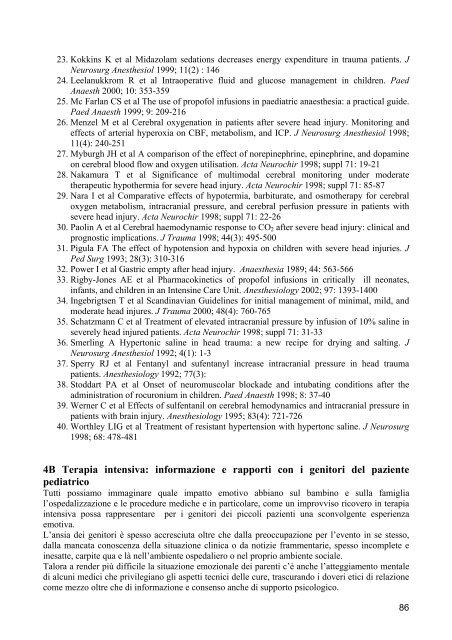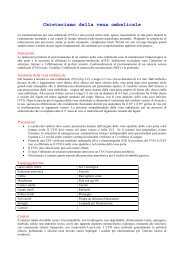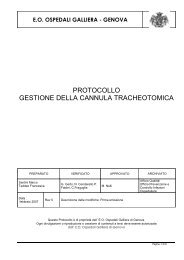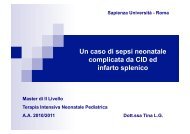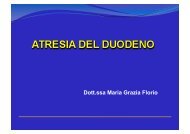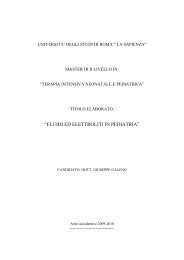Linee guida trauma cranico pediatrico grave SIAARTI-SARNEPI
Linee guida trauma cranico pediatrico grave SIAARTI-SARNEPI
Linee guida trauma cranico pediatrico grave SIAARTI-SARNEPI
Create successful ePaper yourself
Turn your PDF publications into a flip-book with our unique Google optimized e-Paper software.
23. Kokkins K et al Midazolam sedations decreases energy expenditure in <strong>trauma</strong> patients. J<br />
Neurosurg Anesthesiol 1999; 11(2) : 146<br />
24. Leelanukkrom R et al Intraoperative fluid and glucose management in children. Paed<br />
Anaesth 2000; 10: 353-359<br />
25. Mc Farlan CS et al The use of propofol infusions in paediatric anaesthesia: a practical guide.<br />
Paed Anaesth 1999; 9: 209-216<br />
26. Menzel M et al Cerebral oxygenation in patients after severe head injury. Monitoring and<br />
effects of arterial hyperoxia on CBF, metabolism, and ICP. J Neurosurg Anesthesiol 1998;<br />
11(4): 240-251<br />
27. Myburgh JH et al A comparison of the effect of norepinephrine, epinephrine, and dopamine<br />
on cerebral blood flow and oxygen utilisation. Acta Neurochir 1998; suppl 71: 19-21<br />
28. Nakamura T et al Significance of multimodal cerebral monitoring under moderate<br />
therapeutic hypothermia for severe head injury. Acta Neurochir 1998; suppl 71: 85-87<br />
29. Nara I et al Comparative effects of hypotermia, barbiturate, and osmotherapy for cerebral<br />
oxygen metabolism, intracranial pressure, and cerebral perfusion pressure in patients with<br />
severe head injury. Acta Neurochir 1998; suppl 71: 22-26<br />
30. Paolin A et al Cerebral haemodynamic response to CO2 after severe head injury: clinical and<br />
prognostic implications. J Trauma 1998; 44(3): 495-500<br />
31. Pigula FA The effect of hypotension and hypoxia on children with severe head injuries. J<br />
Ped Surg 1993; 28(3): 310-316<br />
32. Power I et al Gastric empty after head injury. Anaesthesia 1989; 44: 563-566<br />
33. Rigby-Jones AE et al Pharmacokinetics of propofol infusions in critically ill neonates,<br />
infants, and children in an Intensine Care Unit. Anesthesiology 2002; 97: 1393-1400<br />
34. Ingebrigtsen T et al Scandinavian Guidelines for initial management of minimal, mild, and<br />
moderate head injures. J Trauma 2000; 48(4): 760-765<br />
35. Schatzmann C et al Treatment of elevated intracranial pressure by infusion of 10% saline in<br />
severely head injured patients. Acta Neurochir 1998; suppl 71: 31-33<br />
36. Smerling A Hypertonic saline in head <strong>trauma</strong>: a new recipe for drying and salting. J<br />
Neurosurg Anesthesiol 1992; 4(1): 1-3<br />
37. Sperry RJ et al Fentanyl and sufentanyl increase intracranial pressure in head <strong>trauma</strong><br />
patients. Anesthesiology 1992; 77(3):<br />
38. Stoddart PA et al Onset of neuromuscolar blockade and intubating conditions after the<br />
administration of rocuronium in children. Paed Anaesth 1998; 8: 37-40<br />
39. Werner C et al Effects of sulfentanil on cerebral hemodynamics and intracranial pressure in<br />
patients with brain injury. Anesthesiology 1995; 83(4): 721-726<br />
40. Worthley LIG et al Treatment of resistant hypertension with hypertonc saline. J Neurosurg<br />
1998; 68: 478-481<br />
4B Terapia intensiva: informazione e rapporti con i genitori del paziente<br />
<strong>pediatrico</strong><br />
Tutti possiamo immaginare quale impatto emotivo abbiano sul bambino e sulla famiglia<br />
l’ospedalizzazione e le procedure mediche e in particolare, come un improvviso ricovero in terapia<br />
intensiva possa rappresentare per i genitori dei piccoli pazienti una sconvolgente esperienza<br />
emotiva.<br />
L’ansia dei genitori è spesso accresciuta oltre che dalla preoccupazione per l’evento in se stesso,<br />
dalla mancata conoscenza della situazione clinica o da notizie frammentarie, spesso incomplete e<br />
inesatte, carpite qua e là nell’ambiente ospedaliero o nel proprio ambiente sociale.<br />
Talora a render più difficile la situazione emozionale dei parenti c’è anche l’atteggiamento mentale<br />
di alcuni medici che privilegiano gli aspetti tecnici delle cure, trascurando i doveri etici di relazione<br />
come mezzo oltre che di informazione e consenso anche di supporto psicologico.<br />
86


